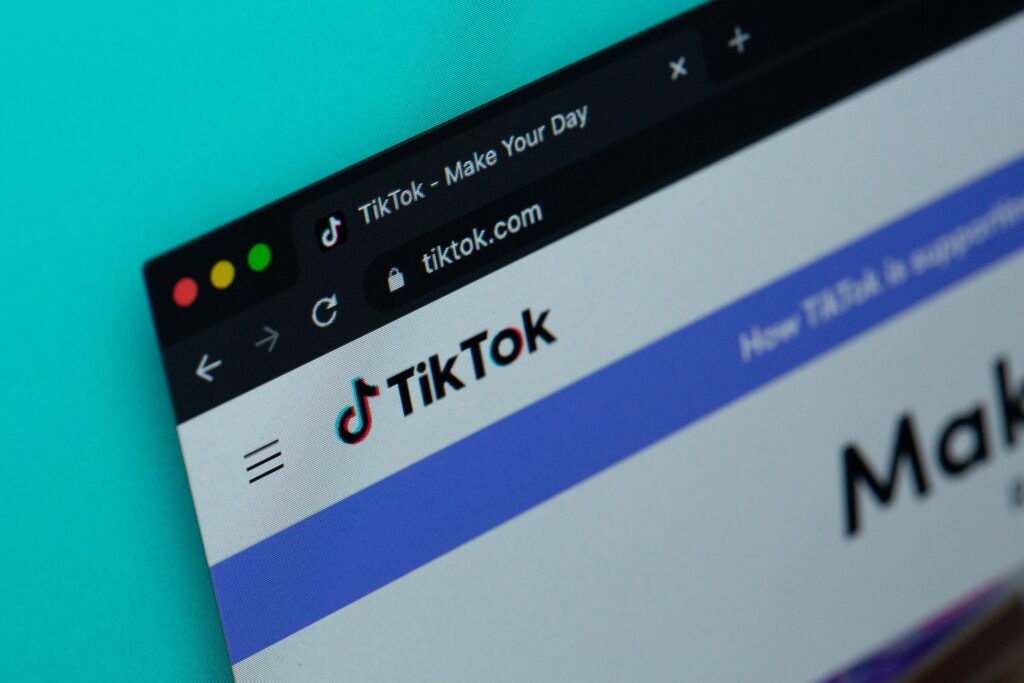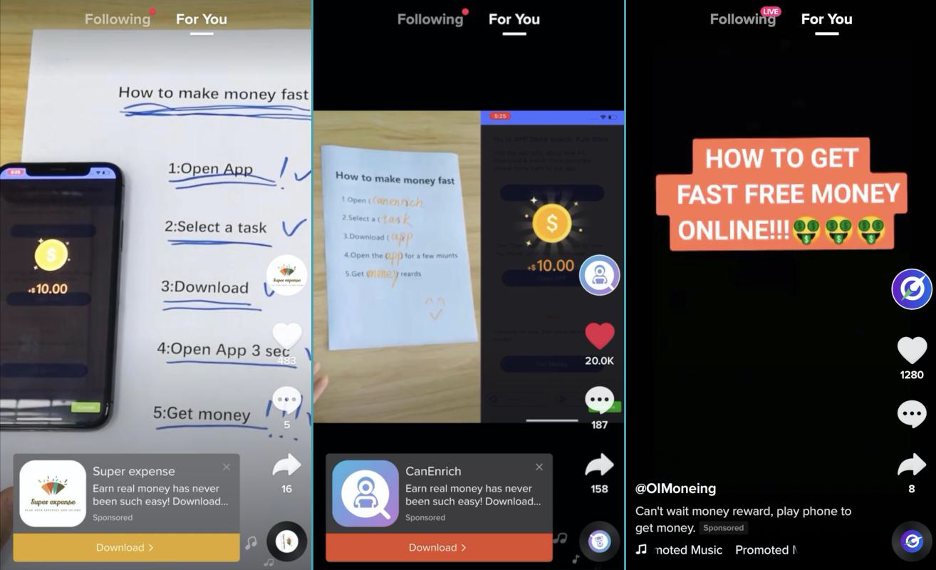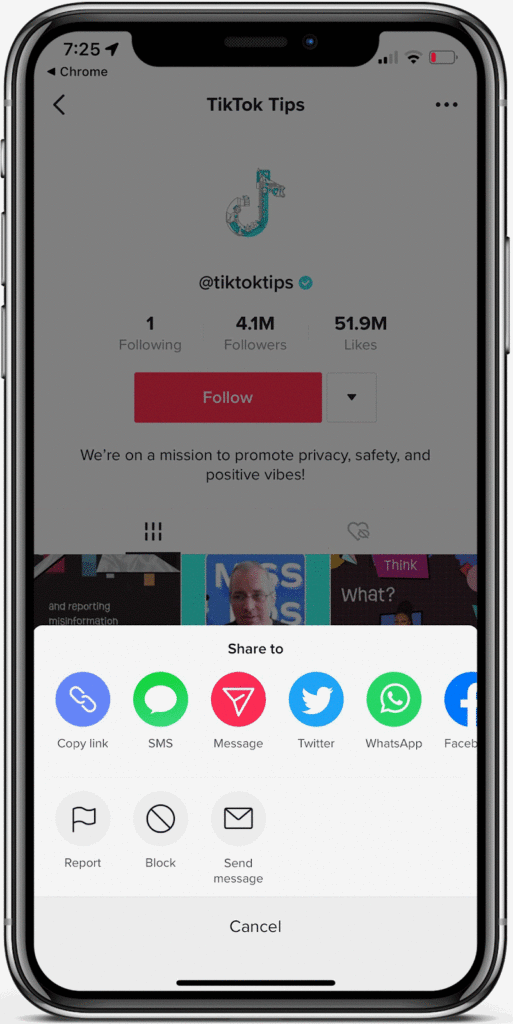The wheel of time turns, ages come and go, and every year there's a new app to keep you glued to your iPhone's screen. It all starts with a lightbulb moment, a helpful solution to a problem.
Facebook was Mark Zuckerberg's solution to helping people connect with their loved ones more easily.
LinkedIn blurred the line between work and leisure, delivering a fun, engaging platform for users to network and build their careers.
Instagram paved the way for visual storytelling, connecting over a billion users through selfies, iconic videos, and hilarious memes.
Twitter, Pinterest, WhatsApp: there's always a new app. But not many apps have risen as astronomically as TikTok has.
Marketers are drawn to TikTok like bees to honey because the platform provides a unique opportunity to connect with younger audiences in a highly playful and creative environment.

TikTok Scams - beware the dark side
But a dangerous underworld lies beneath the dazzling surface of fun, captivating content.
TikTok is a powerful hub for marketers, but it's also a hotspot for scammers. (This is why we can't have nice things…)
When using TikTok, proceed with caution and watch out for scammers that prowl around the platform. The regularity of TikTok scams is well documented on social media. Dozens of posts and enquiries about TikTok have been made on the subreddit r/TikTokhelp. Scrolling through the forum will reveal just how common scams are on the platform.
Our team at Formation Media have gathered insights and tips to help you steer clear of these scams. Here's our guide to avoiding four common TikTok scams.
6 Types of TikTok Scams
Credit repair scams
Like it or not, your credit score impacts every aspect of your financial life, from the interest rate on your next car to whether or not you can rent a home. So if your credit score takes a plunge, you'll likely be searching for ways to pull it up quickly.
Credit repair scammers will be banking on that.
This scam runs on broken promises, as most scams do. The scam artist will promise to remove legitimate negative information from your credit report. In reality, no one can do that.
In the hopes of boosting their credit scores, victims will pay the scammers only to discover that their credit remains unchanged and their money is gone.
Repairing damaged credit takes time, so be wary of anyone who promises quick fixes. Rather than falling for credit repair scams, focus on practical and legal ways to rebuild your credit.

Easy money scams
Money doesn't grow on trees, and you also won't find much of it in get-rich-quick schemes.
Most of us have the good sense to instantly delete emails from foreign princes who claim to offer us good fortune in exchange for our bank details, but scammers are upping their game and are becoming more sophisticated with their tactics. Sniffing them out is now tougher than ever.
As the name suggests, the easy money scam uses the lure of money to trap you in its claws.
These scam artists can catch you in many ways: they might lure you into bogus pyramid schemes, entice you with quick cash offers or even encourage you to download and pay for fraudulent apps. And if you're not careful, you'll fall for the bait — hook, line and sinker.

Here are some signs that you may be dealing with an easy money scam:
- Clickbait headlines – easy money scams often promise incredible profits for unrealistically small amounts of work. So be on guard if you see headlines such as "Earn six figures by working from home part-time" or "Make X pounds/per hour in only X hours/days/weeks/months."
- Requires payment or investment upfront – a legitimate job offer will not require you to pay to apply. The scammers might frame the upfront expenses as payment for a training course or a certificate to gain eligibility for the job, but don't fall for the ploy. Jobs are supposed to pay you, not the other way around.

- A sense of urgency to hire – the scammer might create a sense of urgency by urging you to apply quickly, stating that the job or offer will not be around for long. Here's the thing: they want you to make a quickfire decision without weighing your options. To achieve this, scammers will pressure you to uncomfortable levels. Quick decisions are unsafe decisions. Be on guard. If the opportunity is worth it, it won't reek of desperation.
TikTok online shopping scams
TikTok Shop is a shopping feature available to users on the TikTok platform – it enables sellers, brands and creators to advertise and sell directly on TikTok. Anyone can promote their products through the platform's in-feed videos, product showcase tabs and even on LIVEs.
Pretty cool, right?
Here's where the trouble begins:
There are hordes of scam artists running ads for fake products on TikTok. Many of these scam artists will pose as genuine brands, swindling unsuspecting users through attractive deals.
We advise you to:
- Always inspect the URL of retailer websites. Most retail websites have simple URLs like louisvuitton.com or cultbeauty.co.uk. However, if you see extra characters in the URL and additional words such as "super discounts", "deals", or "offers", it's probably a scam.
- Use the Citizens Advice scam checking tool to scrutinise the retailer's website.
- Watch out if the contact information is shady or unclear.
- Only pay for products using a secure payment service.
- When using unfamiliar retail websites, find out exactly who you're dealing with. Research the retailer.
- Look for spelling and grammar mistakes on the ad or retailer landing page. Be wary if the retailer's website has a poor design.
Free "offers"… that come with a price tag
There's an old saying, "The best things in life are free." Well... maybe that rule doesn't apply in this case. These free offer scams are exceptionally crafty.
You'll have stars in your eyes when you see all the offers: from free video games and headsets to gift cards.
You'll feel like you won the lottery.
What's the catch? Yup, you guessed it: the products are anything but free.
These scams will deceive customers into handing out credit card info in exchange for "free goods", but the scam artist won't mention the part about you paying recurring subscription fees and other unauthorised charges. Very crafty, indeed.
If something is free, there is no need to ask for your card information. Protect your card details and only share them with trusted sellers.
Phishing
Phishing is when scammers pose as reputable companies and send fraudulent messages to trick victims into revealing sensitive information. Unfortunately, phishing happens a lot on TikTok; it's yet another way for sneaky hackers to steal your information.
Usually, this would start with a scammer sending you an in-app message; remember, TikTok would never ask for your account details this way.
The scammer may send you links to supposedly reputable external websites, prompting you to buy products or donate money to fake causes. Any person leading you away to a third-party website requesting sensitive information is almost always trying to scam you.
Whether you are being phished on TikTok, email, or another platform, pay attention to the URLs and names of people you’re dealing with; if those things are misspelt, mismatched, or unverified, it’s the work of an experienced scammer.
Donation scams
Unfortunately, TikTok scammers take every opportunity to capitalise on devastating world events. In times of crisis, scammers will set up fake charities to profit from donations.
They will often directly message users requesting their donations via a third-party website (which is how they will obtain your personal information), or they will use TikTok Live to receive donations from users in real time.
The reality is that your donations will end up in the virtual wallets of the scammers behind those accounts.
In the recent aftermath of the Syria earthquake, TikTok scammers tricked people into donating to their fake cause, by broadcasting a video of the earthquake on TikTok Live, requesting urgent financial aid from TikTok users.
Frequently Asked Questions about TikTok Scams
How do you report a scam on TikTok?
The easiest way to take down a scam account is to manually report it on TikTok. You can do this by following these easy steps:
- Go to the profile of the fake TikTok account.
- Tap on the 3 dots in the top right corner of the screen.
- Select the ‘Report’ option and choose ‘report account’ as your reason.
- On the following ‘reasons’ menu, you can choose the issue you wish to report the account for, for example, ‘inappropriate content’ or ‘pretending to be someone else’.
- Select ‘celebrity’ if you are reporting an account impersonating a brand or organisation, select ‘me’ if the fake account is impersonating you.
- Click submit and await takedown action from TikTok!

How do you spot a fake TikTok account?
There are many indications of a fake account on TikTok, some more obvious than others.
Unlike scam accounts, verified, established businesses tend to have a blue badge next to their account name, indicating that TikTok has verified the brand.
The main giveaway of a fake account could be bad grammar. Be wary if the person messaging you uses bad grammar or phrasing or even sends you direct messages requesting your details.
Is it safe to buy on TikTok?
Yes, shopping on TikTok is safe so long as you exercise caution. You can purchase items legitimately through TikTok shops, which are usually presented by influencers and other discounted products directly from manufacturers. To verify their authenticity, be sure to check out the influencer’s social pages and the brand’s verification status before buying. If things add up, you’re good to go.
However, be wary of scammers who contact you directly, offering a cheap product or service; do not share your details with anyone whose buying process seems rushed or too good to be true. Moreover, if the buying process sends you to another unverified webpage with an unusual URL, you should stop all contact immediately, as this is likely to be a scam.
How to make TikTok safe for my kids?
Scammers on TikTok often target children and teens between the ages of 10 and 19, as this age group is the least aware of online scams and accounts for a large percentage of TikTok users. However, there are things you can do to maximise safety on TikTok for your children.
For example, you can use ‘Family Sharing’ settings to connect your child’s account with your own to monitor their activity and stop them from receiving direct messages from strangers.
Furthermore, you can also set a ‘Restricted Mode’ on your child’s account, which filters out inappropriate or adult topics from their video feed. On top of this, you can also set comment filters, screen time limits, and of course, private all of your child’s creative videos on the platform.
TikTok ad scams: Lessons to be learnt
Unfortunately, there are a lot more TikTok scams out there. We've barely scratched the tip of the iceberg. Here are our top tips for protecting yourself on TikTok, no matter what scams you come across:
- Remember that TikTok will never direct message or email you requesting your password. To double-check an email address's authenticity, ensure that it ends with @tiktok.com.
- If you detect any suspicious activity that you think might be a fraud or scam, report it immediately to TikTok.
- Double-check the authenticity of celebrity accounts - the quickest way to spot a real celebrity account is to search for a verified badge on their profile. But the more determined scammers will find ways to obtain the verified badge. So to be entirely sure of an account's authenticity, Google the celebrity's name and the word "TikTok" to confirm their real handle.
- Do not blindly download every promoted app you find on TikTok - before you download the app, do your research and read reviews to ensure you get what you're paying for. Being vigilant will pay you more than any get-rich-quick scheme can.
- Keep an eye out for bots - if someone drops a message in your inbox, study the message for strange phrases and requests. If the account has an unusual username or the conversation doesn't seem natural, it's most likely a bot. Bot or not, you should never give out personal information to anyone on TikTok.
Ready to dodge these crafty TikTok scams?
We hope you feel more confident and informed about navigating TikTok. It is a fun and engaging platform, so long as you stay vigilant.
Another way to ensure your professional TikTok account stays safe is to let us run it for you. We offer a full social media management service across all social media platforms including Facebook, Instagram, TikTok, Twitter, and LinkedIn. We can help with running paid ad campaigns, raising brand awareness, and directing traffic to your website. Get in touch to find out how we can help you transform your digital marketing strategy today.
Scammers are a crafty bunch, always looking for inventive ways to steal your money. On a mission to stop these scammers, we've created a blog series to help inform businesses about different online scams.
From business directory scams to digital marketing scams, we've gathered tips, insights and think-pieces to keep you informed about all the infamous online scams. Follow us on our journey through this series.
